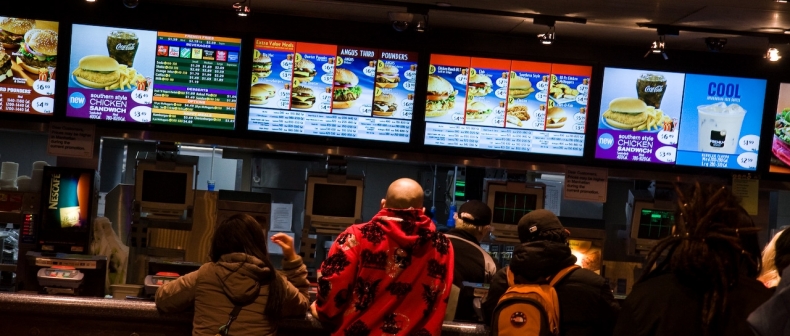
The Toronto Board of Health amended a motion Monday that would force chain restaurants making over $10 million annually, or who have ten or more locations, to list calories and sodium content on their menus. The context is 46 per cent of Torontonians are overweight or obese and people are eating out more and more. The motion is a pretty simple and unobtrusive way to curb brutal and widespread eating practices among the worst culprits. The only deputants who opposed it were vested interests in the restaurant industry. Their arguments were so flimsy that it was apparent beyond a doubt that they didn’t really believe them either. Personally, I find watching these uncontaminated moments of pure bullshit to be the most rewarding parts of my job.
The restaurant industry’s spiel started on a suspect note. “Don’t underestimate the intelligence of the consumer!” Actually, nobody ever went broke underestimating their intelligence, a maxim as reliable as it is unflattering.
Next they suggested that menus themselves don’t need nutritional information because consumers can research it with their smartphones. Only nobody wants to be the person holding up a food court line checking their phone, and researching calories when seated at a restaurant can be stigmatizing.
Next was the economy spin. “We have seven thousand restaurants employing sixty thousand people.” When it’s in someone’s financial interest to argue but there’s no sensible argument to be made, expect a phony connection to jobs. Even though it’s irrational on the surface, there is a desperate hope that it’ll have some emotional traction.
This was followed by an appeal to democracy. “It’s good to have consultation with all stakeholders.” Councillor Perks clarified afterwards that it’s not just good, the city is legally required to inform all stakeholders five business days before a meeting, and this group was indeed consulted twice. Not only wasn’t the restaurant industry surprised by the city’s motion, they were prepared enough to develop a glossy pamphlet advertising their case. Those who oppose a motion always claim it should be deferred because they weren’t consulted.
Next came an argument supposedly in the consumers’ best interest. Restaurant goers should be spared from having “literature shoved down their throat.” Currently, fast food chains claim greater transparency by supplying graphs with literally hundreds of numbers, but this has the reverse effect. Practically speaking, the information is too dense to understand. Including only two important numbers on the menu remedies this.
To be sure, these two numbers are incomplete, but not arbitrary. It’s a compromise in the knowledge that it’s impossible to play personal dietician for everyone. Nobody is claiming this is a comprehensive solution. It’s just one tool of many. The problem is one entrée might have 300 calories in one restaurant but 2500 in another, or a salad might have more calories than a burger. It depends on the oil, the dressings, portion sizes, and other things that change from restaurant to restaurant. This helps solve that.
Perhaps the deputants most outlandish was the suggestion that changing menus and menu boards (the digital screens above the counter) constituted an onerous financial burden that would threaten the already precarious restaurant industry. The affected restaurants are the economically stable ones that frequently change their menu anyway. The costs are negligible and they’ll be notified months in advance. Implementation will not be thrust upon them. The deputants did concede that this would only apply to chains making at least $10 million, but had the temerity to say one day this policy will surely ruin ma and pa restaurants.
Thought experiment: Imagine the big chain restaurants where most of the city eats seriously unhealthy food already had their nutrition information listed on the menu. Would anybody campaign for restaurants’ freedom to withhold this information because sharing it is invasive and onerous?
The City Clerk needs to confirm the decisions for this meeting, but the Board of Health was all for it. Their reasoning was sound and refreshingly free of duplicity.
Councillor Doucette stated that nobody checks online, either at home or at the restaurant, to see about their foods nutritional content because they select on a whim. But if the information is there at the time of ordering they can’t help but see it. They might heed it or not, but it’s there.
Councillor Wong-Tam drew on her experience as a franchisee of a chain to claim that the nutritional value of menu items could be obtained simply by calling head office. They have this information already. Sharing it takes nothing, and people do indeed desire it. Restaurants may make their food healthier if they are forced to share their calorie content.
Councillor Filion expressed particular outrage at the presumption that everyone has smartphones since the unhealthiest food chains are concentrated in the poorest areas where people most likely don’t have these phones.
Councillor Perks said there was an intentional effort to obscure the efficiency of labelling the sodium and calorie content. It’s not a full picture of the food’s health but never pretended to be, and anyway providing such a thing succinctly is impossible. Listing these particular numbers directly on the menu was the recommendation of the city’s “skilled, talented, and knowledgeable” medical staff, and he prefers to trust them.
Councillor Mihevc, who chairs the Board of Health, pointed out that when you see people shop in grocery stores today they don’t just put stuff in the cart the way they used to, but read the nutritional content before deciding whether or not to buy it. They want to be informed. This motion is just a logical extension of that. Given how much Canadians are eating out, why label the information in one place but not the other?
I was amused by his self-righteous pose that followed: he described how Toronto was a leader against smoking, a movement that was ridiculed before it went national and then international. Expect the same. “We’ll be a leader here too.” Not that he’s even wrong, but I laughingly imagine the enraged faces of idiots who perceive this motion as just another curtailing of freedom by the nefarious nanny state. Let nobody confuse the jack-booted baboons that burn books and arrest people in the night with councillors urging chain restaurants to divulge the contents of their salad dressing.
____
Jeff Halperin is a Toronto-based writer. You can follow him on Twitter @JDhalperin.
For more, follow us on Twitter @TorontoStandard and subscribe to our newsletter.














